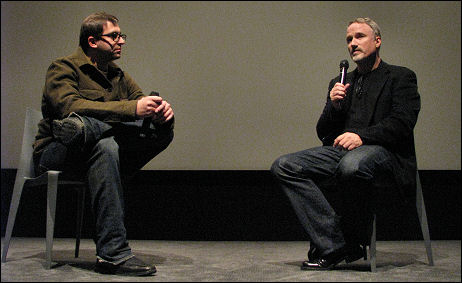Okay, I first saw this on Kris Tapley‘s In Contention. The same art is on the cover of Bernhard Schlink‘s “Author’s Notes” pamphlet handed out at yesterday’s Reader screening.
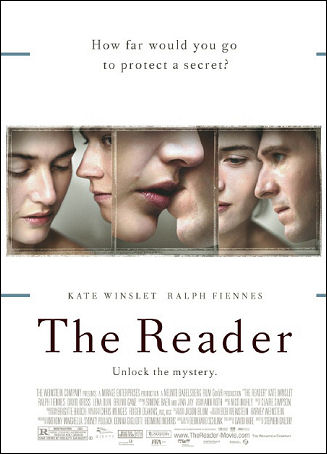
Okay, I first saw this on Kris Tapley‘s In Contention. The same art is on the cover of Bernhard Schlink‘s “Author’s Notes” pamphlet handed out at yesterday’s Reader screening.

I’m such a fool for Martin Ritt‘s The Spy Who Came In From The Cold that I’m thinking of buying the just-out Criterion DVD of same, even though the 2004 Paramount Home Video DVD has always looked fine to me. I’m mulling the buy on the half-chance that the Criterion may look slightly richer and more detailed. Neither DVD Beaver’s Gary Tooze nor DVD Talk’s Jamie S. Rich offer comparisons between the two.

This is old IMDB news, but the plot of Woody Allen‘s Whatever Works is about a May-December relationship (marriage?) between Larry David and Evan Rachel Wood, and her mother, played by Patricia Clarkson, somehow persuading a Manhattan-residing British actor, played by Henry Cavill, to try and seduce Wood in order to break up her marriage to David, whom Clarkson feels is too old for her daughter.

Contrary to what MCN’s David Poland reported on 11.14, L.A. Film Festival director Rich Raddon did not, I’m told, tender his resignation to the FIND board a day earlier over the revelation that he’d donated $1500 in support of Proposition 8 — the California gay-marriage-ban amendment that passed on 11.4. Raddon did, however, submit his resignation yesterday, and it was accepted.
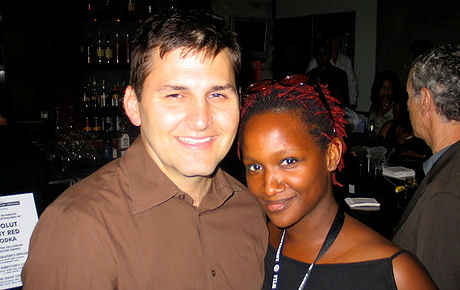
The Raddon/FIND/Prop. 8 situation was inflamed or at least re-addressed in a Sunday L.A. Times article by Rachel Abramowitz that ran two days ago.
Abramowitz wrote that Raddon “offered to resign last week.” Verbally, she apparently means, and not in the form of a letter that said “I resign.” What I’m told is that Raddon “never resigned, ever, so when the board voted unanimously, they weren’t voting not to accept the resignation, although they did decide not to fire him.”
In any case, the anger about the $1500 wouldn’t go away, and after Abramowitz’s article it was time to fold the hand.
“‘There is still roiling debate within [FIND],” distributor Howard Cohen, a gay advisor to the film festival, told Abramowitz. “Is it okay to let this go? There are a lot of gay people who work at Film Independent. The issue has not been closed.” .
Director Gregg Araki “has said he won’t allow his films to be shown at the L.A. Film Festival,” Abramowitz reported. “Others, such as Milk producers and gay activists Dan Jinks and Bruce Cohen, say they’re going to ‘study in depth all the facets of our specific situation before making a decision.’
Araki said that Raddon “should step down. ‘I don’t think he should be forcibly removed. The bottom line is if he contributed money to a hateful campaign against black people, or against Jewish people, or any other minority group, there would be much less excusing of him. The terrible irony is that he runs a film festival that is intended to promote tolerance and equality.’
Raddon declined to talk to Abramowitz, but Dawn Hudson, executive director of Film Independent, said, “Are we happy with his donation? No. But he has a right to his religious and personal beliefs.”
Outside Hollywood’s left-liberal, gay-friendly political arena, that is.
Raddon’s departing statement is included in this Indiewire story.
The shorthand take on Button is that it’s a technical knockout, atmospherically sublime, emotionally poignant, and yet — a key distinction — fundamentally a Gump thing. Artier, more elegant and far less mawkish and chewy than what Robert Zemeckis delivered 14 years ago, but essentially drawn from the Gumpian well. It is therefore not, in my head, as fully fresh and stand-alone bold as Steven Soderbergh‘s Che — a film that doesn’t play the movie game but is stellar and studly in that it owes nothing to anyone or anything else, and the fact that it is all muscle and fat-free.
Che is still and will remain my Best Film of ’08 choice, and if the will of the Movie Gods carried any kind of clout with the mortals scrambling around on terra firma it would be at the top of a lot more lists. The hell with “emotional delivery” in this instance. The hell with “movie moments.” No film has the balls, the clarity and the take-it-or-leave-it honesty of Che.
As I wrote last week, “Soderbergh’s lack of interest in even beginning to attempt to ‘entertain’ the popcorn-munchers is not a plus sign in and of itself, but critics and smart industry viewers should at least be able to see what’s going on here and at least give credit where due. Che is the pure and even made majestic, the telling of a two-act story that could only have been lessened by being shaped into ‘drama.’ It is naturalism in the rough, unpretentious verite magnificence, poetry in the details, a form of truth both literal and eternal.”
Revolutionary Road is my #2 for ’08. A movie about a glum situation and doomed characters that isn’t itself glum or doomed, but tight and true and searing. A film that reflects some aspect of the real grit out there. A film that says “this could be about you” and in fact is about you, suckah. The strongest heavyweight drama I’ve seen all year so far. A corrosive and heartbreaking masterwork.
My third-place favorite is Benjamin Button, fourth is Doubt and fifth is Slumdog Millionaire, followed by Milk, Frost/Nixon, The Visitor, The Wrestler and Nothing But the Truth. Forget The Dark Knight as far as the Academy is concerned — it’s not gonna happen.
“I saw your mini-review of Button and I have to say I disagree with the suspicion that under 30’s may not be cool with it. (Okay, okay, I’m 30 but same difference.) I found it touching and emotional in the best possible way (i.e., not sentimental). It’s a complete left turn for Fincher in his career, especially after Zodiac, which I also liked a great deal. I agree that the film is a gentle riverboat ride, but I liked that, and I was very happy that Fincher did not throw in a bucketful of Zemeckis schmaltz.” — conveyed in an e-mail by a friend who saw Button at last night’s MOMA Titus screening, and whom I’m not identifying unless he says it’s cool.
“When I say ‘trendy’ I mean Slumdog Millionaire is warmed-over Dickens with a multi-culti sheen, and critics (who are indeed gushing — 85 on Metacritic, with lots of 100 scores) feel good about praising something that takes World Cinema and throws it into a blender. Imagine the same story with a trailer-trash white kid in a setting of domestic rural poverty and meth labs — same reviews?” — HE reader MikeSchaeferSF.
Well, it was enough for me in a cinefile-ish, film-magic appreciation sense, but I can’t say that David Fincher‘s sublime and poignant new film truly — what is the phrase? — “reached inside and stirred the depths of my soul.” I will certainly see it again, but I can’t say I’m as hungry for a second immersion into this gently emotional death-trip movie, this dreamy-sad glide through time and memory and the textures and aromas of 20th Century America, as I was when I first saw Fincher’s Zodiac some seventeen or eighteen months ago.
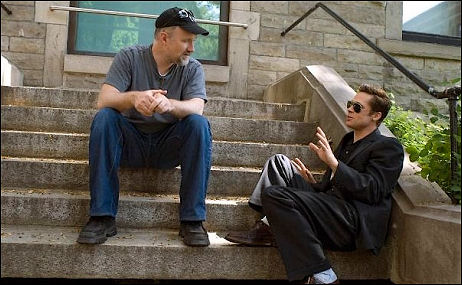
Zodiac is a legendary art film — a deeper, fuller thing every time I re-view it because of how it never tries to overtly persuade its audience that it’s anything more than a whipsmart policier about a legendary cold case. Because the theme of obsession is simultaneously dramatized and embodied by the obsessive nature of the film itself. Because it’s settled and confident in its own skin and lets the story tell itself while Fincher, remarkably, builds it into something more than the sum of its parts.
The Curious Case of Benjamin Button, on the other hand, feels very caught up from the start in its attempts to mesmerize and create a burnished good-old-days atmosphere. And it works like a champ in this respect. I’ll never forget the ripe vibe this movie casts. And yet I’m not sure if I really know what it’s saying, or it’s really “saying” anything other than that life is an adventure to be savored and lived to the fullest. That’s a good thing to express in any fashion or medium, but I was saying to myself as I watched it unfold, “Yeah, yeah, I agree, yes….and?”
The basic idea behind the original F. Scott Fitzgerald story basically says that the best part of life comes at the beginning and the worst part at the end, and what would a man feel and learn if the journey was reversed?
Like Forrest Gump, which was authored by Button screenwriter Eric Roth, Fincher’s langorous tale is about a passive, good-natured fellow — Brad Pitt‘s Benjamin Button — who lives a kind of charmed (and at the same time somewhat cursed) life that’s rooted in New Orleans but involves much travel, traverses decades and nurses a lifelong, never-waning love for a beautiful spirited woman — Cate Blanchett‘s Daisy.
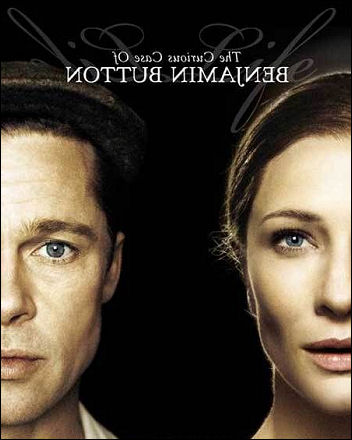
It starts with old-baby Pitt — a withered, carcassy, white-haired infant — being born in World War I-era New Orleans, and then watches him de-age and gain strength, enjoying the lusciousness of living more and more, as he moves through the ’20s and ’30s and into World War II as an old and then a middle-aged man. And then gradually as a progressively younger and hunkier guy who looks cool and likes to ride a motorcycle and whose blissful sensual peak comes at the height of youth and vigor in his early 40s, 30s and 20s, which manifest 40, 50 and 60 years after his old-man birth (and happily coincides with Blanchett’s normal-progression trajectory). And then he’s a teenager, a kid, a toddler and a baby.
The renderings of Pitt’s and Blanchett’s various age-states are just about perfect. Face-pasting, makeup, prosthetics, digital-wrinkle removing — all or most of it as exquisite as the wizardry of new and emerging digital technology can miraculously provide.
But you get used to all this. Pitt’s reverse-aging is endlessly absorbing, but it loses its wow-ness after a while, and once it levels off you’re basically left with a story about a guy just living a life. And like I said earlier this morning, his journey has little in the way of story tension and the rooting interest isn’t really there because all he’s trying to do is be with the love of his life, Daisy. Well, that happens finally when they’re both young and close in age. But then time pulls them apart, and then they’re together again and true-heart Daisy becomes his care-giver when he can no longer fend for himself.
Like I said earlier, it’s not that you don’t care for Pitt’s Button but he’s a watcher, an observer, an eternal quiet man. He’s there to absorb and experience and love and savor, but he’s nothing like a take-charge doer with any kind of primal goal or need. We’re talking decades here, and the movie is basically a Gump thing — a leisurely cruise on a slow riverboat down a pastoral but mostly rapid-free river. Many intense and eye-filling things happen. The randomness of life, the give-and-take, the eternals all bleed into the whole. But the story is basically a journey of chapters — this happens, that happens, shit happens.
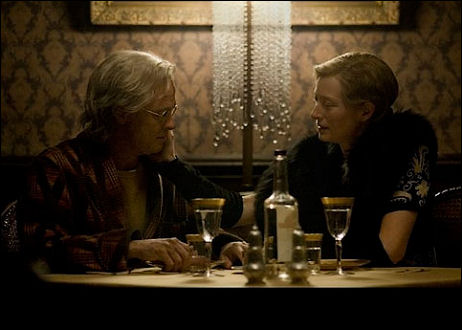
Button is filled, yes,with all kinds of touching meditations and observational riches and a constant awareness of the here-today, gone-tomorrow thing. It is a moving film to sit through, but it provides only as much warmth and emotionalism as director David Fincher and screenwriter Eric Roth felt was right and true and appropriate.
Benjamin Button is a dream — rapturous, essential, eternal filmmaking. And with a heart that is kindly, charitable, gentle, open. It’s beautiful, it’s unique, it’s bold…and I’m not at all sure that it’s going to reign supreme as a Best Picture candidate. Nor am I persuaded that it’s going to make any kind of real money. It’s a fascinating, very brave and half-wonderful film, but it’ll be a real challenge selling it to the stooges out there, particularly the under-30s.
I agree with Variety‘s Anne Thompson that it’s “an historic achievement, a masterful piece of cinema, and a moving treatise on death, loss, loneliness and love” and that “it may pack a more powerful punch the older you are and the more people you have lost.” But it doesn’t feel like a Best Picture slam-dunker for reasons stated above and before.
I’m tapping out my Benjamin Button reactions as we speak, but I have a phone interview set for 9:30 and I have to focus on that for a bit. All I know is that I don’t know what’s going on with the Best Picture race. Not any more. I’m lost. The tracking software in my head that has generated those old gut hunches for years on end isn’t working. I don’t mean to get all Wim Wenders–Dennis Hopper on you, but I suddenly don’t know who I am or who anyone else is.
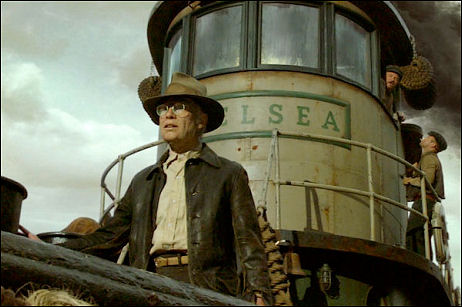
I’m not at all persuaded, in other words, that Button, gently touching life-journey meditation and technical landmark film that it obviously is in many respects, is the Big One. It’s beautiful and immaculate and lovingly brush-stroked to a fare-thee- well, and thematically deep and far-reaching, but boil it all down and it’s basically a leisurely Gump cruise on a slow riverboat down an easy river, and filled with all kinds of touching meditations and pastoral riches and a constant awareness of the transitory tenuousness of life. Which is fine. It moves, haunts, entrances, caresses and provides as much warmth and emotional reflection as director David Fincher and screenwriter Eric Roth felt was right and appropriate.
But the story tension is nil (no “what’s gonna happen next?” intrigue), the rooting interest is zip (which isn’t to say you don’t care for Brad Pitt’s Button character but he’s nothing if not a fundamentally passive character — an absorber rather than a decisive doer with a primal goal or need) and that schmaltzy emotional compost that Robert Zemeckis knows how to shovel and which a film like this could use is barely exploited.
Fincher is one of my filmmaking heroes, Lord knows, but he’s too sardonic a fellow to drop his emotional pants. Button is a magnificent living painting and a technical dazzler for the ages, but he may not have been the right guy to make a film like this. It’s not a cold film, as some have alleged, but (and I hate saying this) it needs to be a little bit sappier and schmuckier and schtickier to win over the Academy squares and popcorn munchers in the plexes. It’s a little too burnished and upmarket (i.e., sparing, carefully measured) for its own good.
I’ve selected and pasted the live-wire graphs from Annie Karni‘s Harvey hit-job piece, called “Is Hollywood Hit Man Harvey Weinstein Running Scared?,” in Page Six magazine, which was published two days ago (11.23). Here and there I’ve thrown in HE comments.

“Has Harvey Weinstein lost his Midas touch? Has he spread himself too thin too quickly? Or is it a fool’s errand to ever really count Harvey Weinstein out of the game he himself created?
“Whatever the case, problems are apparent. In his glory days, Harvey spared no expense to lure top talent to star in his films. ‘He thinks nothing of flying to London for dinner and trying to talk you into a role,’ actress Nicole Kidman told New York magazine in 2001. Today, insiders say, he can’t afford to. ‘When Harvey’s flying talent, he flies them on his frequent-flier miles,’ says a former top executive at the Weinstein Co. ‘Even if it’s a $200 ticket from L.A. to San Francisco, he doesn’t pay.’ HE comment: I’ve been hearing for many months that Harvey is on the ropes, and stories about him shaving costs however and whenever obviously fit into this. That said, only a fool spends money like a nouveau riche hotshot. There’s nothing wrong with using air miles.
“Media watchers say that without Disney, Harvey has become just ‘another indie guy at a time when it’s very hard to be an indie guy.’ (Independent studios have to wrangle outside financing, often from Wall Street investors, and bankrolling movies typically drops off the priority list during a financial crisis.)
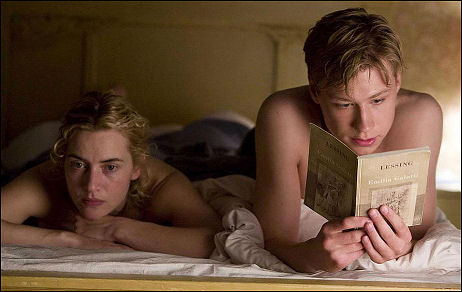
“Harvey claims that his company is running on all ‘six cylinders’ but his executives are fleeing in the wake of rumors that the business
“The Weinstein offices on Hudson Street don’t look like the backdrop of a business that is printing money. The finance and marketing teams are stashed away in cubicles. Empty cartons litter the hallway, as if the Weinstein Co. has just moved in, or is on its way out. Movie posters advertising Zack and Miri Make a Porno and Soul Men decorate the waiting area. But these recent films are not the critical hits Harvey needs to rule awards season and redeem his reputation.
“For that honor, Harvey is banking on The Reader, which is set to open December 10, and the musical Nine, which will premiere in 2009. But insiders claim that major financial turmoil within the Weinstein Co. has been revealed through these films.” HE comment: Nine, maybe. The Reader, nein.
“Harvey has said that Nine, starring Nicole Kidman, Penelope Cruz, Kate Hudson, Marion Cotillard, Judi Dench, Sophia Loren and Daniel Day-Lewis, will be ‘bigger than Chicago’ — the Miramax film that won Best Picture in 2002. ‘He sees it as his transformative hit,” says one industry souce, explaining why last year Harvey was turning down offers to co-finance the film. ‘He wanted to own it, but he ran out of gas. He’s putting on a front that it’s business as usual, but he ran out of money and couldn’t finance it himself.’
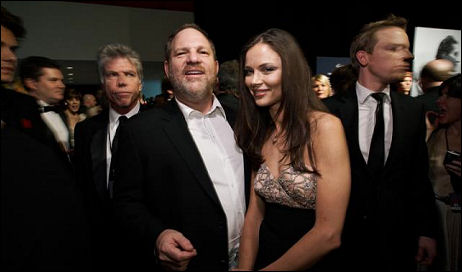
The Reader “‘is his one movie to get back in the Oscar game this year,’ says one former executive. ‘It’s his only shot for Best Picture, which is why he’s insisting on releasing it this year, even though the director doesn’t want to get it done.'” HE comment: I’m sorry, but believing that The Reader will be some kind of Oscar cow is wishful thinking. I saw it yesterday, I felt the vibe in the room, and I know whereof I speak. It’s far from a rank embarassment, but The Reader doesn’t feel to me like a formidable power-punch Oscar contender. It feels like something that should come out in February or March or September or October. It has a fine and immersive Kate Winslet performance as a lovestruck ex-Nazi concentration camp guard, and the aura of a classy, finely rendered, carefully burnished Oscar-bait film — but it doesn’t satisfy or connect like it needs to. Certain character aspects and actions feel quizzical and unfocused. The last 20 or 30 minutes in the third act are supposed to bring it all home and turn your insides into mush, but they don’t.
“‘Old Harvey would have gotten Sam [Riley] a nomination for Control [a 2007 Weinstein Co. biopic about Ian Curtis, the lead singer of Joy Division],’ an insider claims. HE comment: I pushed Riley as hard as I could in this column last year, and I feel the absence of corresponding energy, trust me, coming from the Weinstein Co.
“‘New Harvey isn’t promoting his films with the publicity and advertising needed to get in the Oscar race. He isn’t focused. He’s having too much fun trying to have a piece of everything. Unless they get great people in there at the top, I give [his company] a year,’ a source says.
“Although the Weinstein Co. employs 240 staffers (roughly half the size of Harvey’s staff at Miramax), last month four top executives left, with some even turning down promotions.
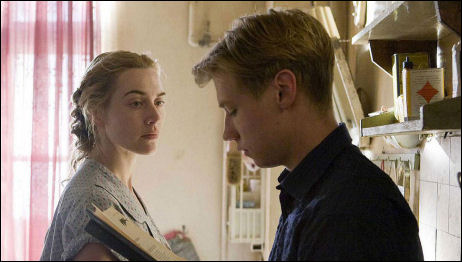
“‘The company is relying on a junior production staff,’ say insiders. ‘Nobody wants to work there so they have a problem replacing people,” says one source. “He’s been looking for a head of marketing for two years. Nobody wants that job. Michael Cole left his position as head of production and they haven’t gotten anyone to fill it.’
“Many longtime employees say Harvey has surrounded himself with too many yes-men who are afraid to tell him when he’s making poor decisions. Since the company went independent, ‘scripts were forced upon the slate that no one felt were smart projects to invest in,’ says a former executive, listing movies such as Dedication, The Last Legion and Grace Is Gone as missteps. ‘When people are shopping their projects, [the Weinstein Co.] isn’t their first choice. Miramax was everyone’s first choice.’
“Executives also complain that budget cutting is affecting their ability to be successful at their jobs. In September, for instance, Harvey didn’t fly his co-head of acquisitions, Maeva Gatineau, to scout for films at the Toronto International Film Festival. (Maeva was one of the four executives who recently left the company.)
“Last year, Fortune magazine reported that the Weinstein Co., which was bankrolled by $1.2 billion from Goldman Sachs investors, was expecting to be profitable by 2008. But employees say that ‘there [are] constant rumors that they have no money.’ Harvey maintains that the company will bring in more cash now that he’s focusing his energies on film.
“It is time for Harey to stage a comeback as grand as the one he produced for John Travolta in 1994’s Pulp Fiction. Don’t count him out yet — after all, he’s Harvey Weinstein.” HE comment: Nine, eh? I hope it all works according to plan. Harvey is a true Catholic in terms of his movie worship. The financial fortunes of the Weinstein Co,. aside, his brassy spirit is a vital component in this business. I feel more invested in the legend of this guy than I am often willing to admit.
It was raining this evening as I came out of the MOMA screening of Benjamin Button, so I bought a $15 umbrella for my walk back to 42nd and 8th Avenue. I put the damn umbrella on the floor of the Boulevard East bus under my seat. Fifteen minutes later I’d discovered someone had stolen it. Who steals umbrellas on buses? I’ll tell you who does this. New York animals do this. I had ownership for a total of 25 minutes.
